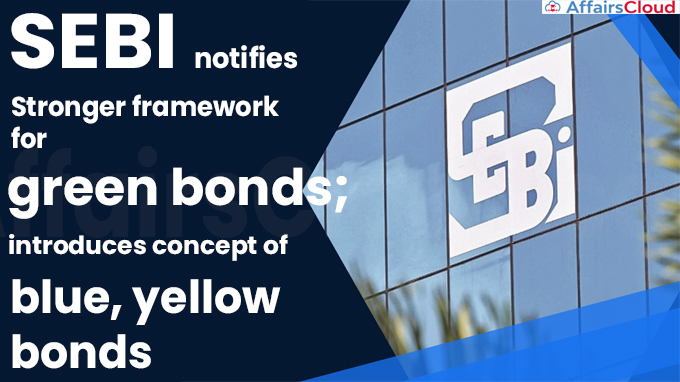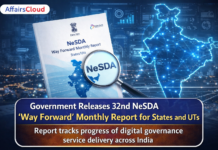 The Securities and Exchange Board of India (SEBI), India’s capital market regulator, has strengthened the green bond framework by introducing “Blue” and “Yellow” bonds as new modes of sustainable finance.
The Securities and Exchange Board of India (SEBI), India’s capital market regulator, has strengthened the green bond framework by introducing “Blue” and “Yellow” bonds as new modes of sustainable finance.
- These bonds are subcategories of Green Debt Securities (GDS), with ‘Blue Bonds’ pertaining to water management and the marine sector and ‘Yellow Bonds’ pertaining to solar energy.
A proposal in this regard was approved by the SEBI board in December 2022, and as a result, it has amended the rules governing the issuance and listing of non-convertible securities.
Green Debt Securities (GDS)
According to the regulatory framework, GDS are debt securities that are issued to raise funds for projects or assets that belong into specific categories.
Sustainable Finance
Sustainable finance is the process of taking environmental, social, and governance (ESG) factors into account when making financial investment decisions, resulting in increasing long-term investments in sustainable economic activities and projects.
Backdrop
i.SEBI has enhanced the green bond framework by increasing the scope of GDS to include new modes of sustainable finance related to pollution prevention and control as well as eco-efficient products.
- These measures were taken in alignment with the existing framework for GDS with the updated Green Bond Principles (GBP) recognized by the International Organization of Securities Commissions (IOSCO).
ii.In 2021, Indian companies raised nearly USD 7 billion through ESG and green bonds, up from USD 1.4 billion in 2020 and USD 4 billion in 2019.
- Most green bonds issued by Indian issuers are listed on offshore exchanges, as issuers find it more appealing to list on bourses outside of SEBI’s framework.
iii.SEBI stated in its November 2022 consultation paper that one of the primary barriers to further growth has been a consistent and robust strategy to classify what is considered “green,” which has resulted in “greenwashing.”
- Greenwashing is described as the practice of directing proceeds from green bonds to projects or activities with lesser environmental benefits.
Key Amendments to the Green Bond Framework
i.Subscription Period: A public offering of debt securities or non-convertible redeemable preference shares will be kept open for subscription for a minimum of three and a maximum of 10 working days.
- The issuer would extend the bidding or the issue period specified in the offer document for a minimum of 3 working days in the event of a revision to the price band or yield.
ii.The issuer may extend the bidding (issue) period specified in the offer document if there is a situation of force majeure, a banking strike, or similar circumstances, for reasons that must be recorded in writing.
- The overall issue period, however, would not exceed 10 working days.
iii.As per the rules, an issuer who issues non-convertible securities has the right to recall such securities before the maturity date.
- Prior to maturity, the issuer of a green bond must notify all eligible holders of such securities as well as the debenture trustees of the recall or redemption of non-convertible securities at least 21 days before the day on which such rights can be exercised.
iv.The issuer will also be required to send a copy of such a notice to the stock exchange where its non-convertible securities are listed so that it can be published on its website.
SEBI Modifies Operational Structure for Credit Rating Agencies
SEBI revised its operational guidelines for Credit Rating Agencies (CRAs), mandating that by March 31, 2023, they have a detailed policy in place regarding the non-submission of crucial information by issuers, including quarterly financial numbers.
Backdrop
SEBI stated in its circular for CRAs dated February 3, 2023, that these requirements would be in effect by March 31, 2023.
- Prior to that, SEBI issued an operational circular on CRAs in January 2023, which was to take effect on February 1, 2023.
Key Points:
i.The detailed policy should include methods for evaluating the risk of non-availability of information from the issuers, including non-cooperative issuers, and the measures to be done under different scenarios in order to determine the status of non-cooperation by the issuer company.
ii.Additionally, CRAs must adhere to a uniform practice that considers 3 consecutive months of non-submission of a no-default statement (NDS) as a reason to contemplate migration of the ratings to INC (issuers not cooperating) and must tag such ratings within seven days of 3 consecutive months of non-submission of an NDS.
- Before the expiration of 3 consecutive months of non-receipt of NDS, the CRA, in its discretion, may migrate a rating to the INC category.
iii.The Managing Director (MD) or Chief Executive Officer (CEO) of a CRA and any other CRA employee with business responsibilities will not be a member of the rating committees of the agency.
iv.When a credit rating of securities listed on a stock exchange is withdrawn, the CRA must assign a rating to such securities and issue a press release in a prescribed format, unless there are no outstanding obligations under the security rated by the CRA or the company whose security is rated is wound up, merged, or amalgamated with another firm.
- The reason for the withdrawal should also be mentioned in the press release.
v.Considering guidelines on listed securities or instruments that fall under the purview of other financial sector regulators, SEBI stated that issuers of such instruments and anyone associated with them will follow the rules as mandated by such a financial sector regulator.
- Furthermore, if such instruments are listed on a stock exchange, the rules prescribed by SEBI from time to time will remain in effect.
Click here for official notification.
Recent Related News:
SEBI has introduced performance benchmarking and categorization for the Portfolio Management Services (PMS) industry w.e.f. April 1, 2023.
These norms are similar to the current norms in mutual funds. It will help investors assess and compare the performance of service providers.
About the Securities and Exchange Board of India (SEBI):
Chairperson– Madhabi Puri Buch
Headquarters– Mumbai, Maharashtra
Establishment– 1992




